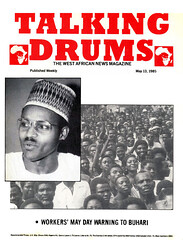Doe's biggest dilemma
By K. P. Kollie
"If Tolbert were alive and stood for election against Samuel Doe, the former would win with a landslide", said one University student activist who was jailed several times under the Tolbert regime. And this is a fact!
Although Tolbert was far from a saint when it came to political and civil liberties, Doe has made him look like one. Students, especially those from the now wrecked University of Liberia were Tolbert's arch enemies. They led demonstrations and mobilized the people, thus encouraging the military to seize power.
But the late President, despite what at times seemed to be outright provocations, never sent a student to the notorious Belle Yalla Prison located in the high forest of the country which is only accessible by air. No student was sentenced to death for a written appeal to government and Tolbert never ordered the army to invade the University with the accompanying result of death, rape and rampage. These acts are all to Doe's credit (discredit?).
Besides, despite his obvious greed for wealth, Tolbert never executed anyone for political reasons. Under Doe, according to his now exiled Commanding General and colleague in the 1980 coup, Thomas Quiwonkpa, there have been many secret executions. apart from his five colleagues who were tried by the Kangaroo Military Tribunal and executed for allegedly plotting to overthrow him (Doe).
The obvious and blatant multiplication of political crimes which Tolbert was accused of, led a local newspaper to recently publish all the initial decrees passed by the then People's Redemption Council. Under the caption "There is a Law", the paper published decrees dealing with penalties for corruption, for the monopolisation of political power by one group, etc. It was an indirect reminder to Doe that he is outdoing Tolbert in the issuing of decrees for political and economic offences. There are reasons: Doe's National Democratic Party of Liberia (NDPL) has become the defacto government, which determines who gets employment, receives contracts, and other benefits. Anyone serving in government is automatically an NDPL member. Arbitrary arrests and imprisonment of opponents have become institutionalized.
During the trial of a Liberian People's Party member Dusty WoloKollie, one of the witnesses for the accused, Mr Albert Porte, 77, and a long-time critic of both the Tubman and Tolbert regimes, lamented that Liberians "are now afraid to talk" for fear of harsh reprisals. He admitted that he welcomed Doe and his colleagues when they took power in 1980, but that he has now changed his mind. Mr WoloKollie is on trial for writing a statement demanding the release or trial of Dr Amos Sawyer and other LPP members accused of plotting to overthrow Doe. All were later released without charge.
Against this background it is certainly paradoxical that Doe would want to become a civilian President under a Constitution. He is highly intolerant of criticism, and this has led him to clash with both the press and the church. The only reputable paper in the country, the DAILY OBSERVER, is now closed for the 5th time. Reason: The paper did not give prominence to a party the NDPL had for shoe-shine boys in Monrovia. According to his Justice Minister, Jenkins Scott, this was a disrespect to the Head of State.
The one-time Editor of the government owned New Liberian newspaper, Mr Tom Kamara, was dismissed for printing the picture of Doe's million-dollar house in the jungle of his home town, about five hundred miles from Monrovia. Since then, Mr Kamara has been continuously harrassed by the regime, leading to three imprisonments in less than three years. In all imprisonments, there were no charges or trials.
That Doe will win a free and fair election is laughable to the man in the street. He has no programme to sell. After five years, many are now looking back with nostalgia on the bad old days. "At least we were paid on time, and did not have to pay so many taxes", said one furious Civil Servant.
When the Liberian Council of Churches recently appealed to him to repeal decree 88a, a law that forbids criticism of the government, he threatened to jail any church leader who, he said, gets involved in politics. The Council responded that it is the obligation of the church to speak against evils in the society. Thus the impasse.
"As the campaign draws nearer", said one foreign diplomat here, "I am anxious to hear what Doe will say to convince the electorate: political rights, economic prosperity, or basic human rights? It will be very, very interesting", he said.
Nevertheless, there might be no campaign in the democratic sense, because the government is determined to obstruct the registration of other parties. Already, the Liberia Action Party and the Unity Party have been subject to long legal battles by government-hired citizens.
The Liberian People's party presented its final registration requirements over two months ago, but the Elections Commission has refused to publish the Party's registry for possible challenges in accordance with the election laws. The United People's Party has been indefinitely suspended for allegedly distributing information materials about the party. The Commission has argued that this is illegal, although general Doe's NDPL air-dropped and distributed leaflets several times prior to its registration.
